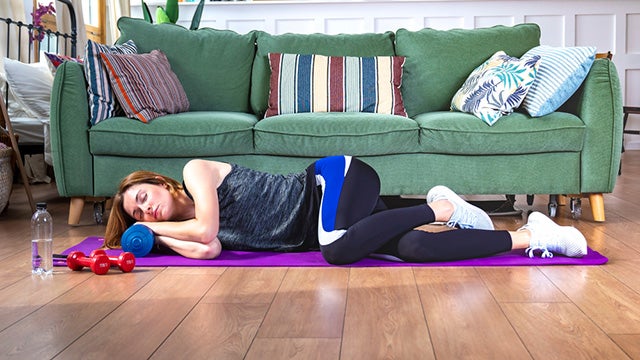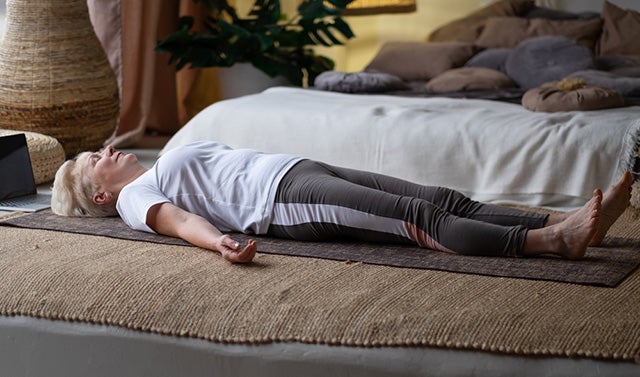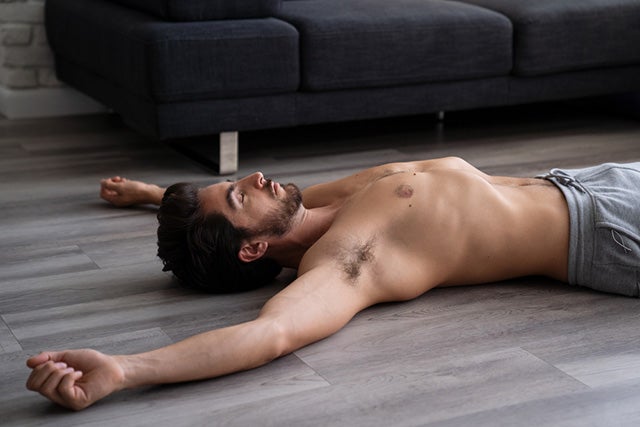Getting in a good workout during the workweek can be a practice in scheduling. Most exercise occurs either before your day officially gets started, or later in the evening, and can present conflicts with other events.
You may have heard that you could be interrupting your sleep cycle when you prefer getting your sweat on later in the day, but are you aware this might not be true? You don’t have to set your alarm earlier and earlier just to keep in shape. Sleeping after a workout isn’t the bad thing you may think it is.
Myths Of Sleeping After a Workout
Rumor has it that exercising later in the evening will interrupt your sleep. When you sleep your heart rate lowers and your body temperature rises – the opposite of what exercise does. Exercise also raises your adrenaline, an energy-providing response.
However, this doesn’t mean you can’t fall asleep and sleep just as deeply as ever after a workout. In fact, sleeping after breaking a sweat can be beneficial to your overall health.
For some people, they may find winding down and relaxing to be a challenge after more strenuous exercise, and a calming option (such as yoga) might be a better choice compared to a strenuous cardio session. Despite that, most people find that once they make evening workouts part of their regular routine, their body quickly adapts, and sleep issues become something of the past.
Benefits of Sleeping After a Workout
Sleep is essential to body and mind recovery. While you sleep your body cycles through various stages to help lower your heart rate, respiration, and body temperature to increase blood flow to smooth and heal your body.
Not only are your muscles and tissues fed with oxygen-rich blood and nutrients, your mind is also processing and storing information – an incredible benefit to athletes who depend on muscle memory, reaction time, and performance stamina.
When you exercise, you are taxing not only your muscles and tissues but also your bones. Sleeping after a workout helps to restore and recover those areas of focus more quickly than if you waited all day. In fact, it is beneficial to nap or go to bed after a particularly strenuous workout to help move nutrients to your muscle groups even faster.
Napping or going to bed for the night after a workout definitely helps recover sore muscles faster, but sleep also provides the ability to recover sleep debt, reduce lasting fatigue, and increase mental alertness.
You might want to read this: How Exercise Improves Sleep
Concerns about Sleeping After a Workoutt
Mentioned above is how the rise of body temperature and endorphins after working out can interrupt your sleep process. If you are prone to this, you might want to avoid working out right before bed. But, most people find that if they make this a regular habit it no longer is a problem.
If you are considering napping after a workout to help provide a quick recovery session, consider the implications of a midday nap. To start, you should never sleep more than 20 minutes when napping unless you plan on staying asleep for at least 2 hours. This is due to how your sleep cycles and waking before you enter into a deeper sleep (or allowing yourself the time to cycle through all stages of sleep) will help keep you from being groggy and confused when you wake up.
Naps can also interrupt your nighttime rest more than exercise ever will. If you struggle with sleep at night due to napping, avoid a nap since longer, restorative sleep is much better for your body recovery than shorter naps.
When Sleep and Exercise are a Concern
If working out at night prior to going to sleep is a habit you are in, then you are already used to drifting off to sleep after all the work your body has done. But if you find yourself regularly overtired and struggling to stay awake after your exercise, you may want to speak to a healthcare professional.
You may be overtaxing your body, or you may have something completely unrelated to your exercise going on. You shouldn’t struggle to keep your eyes open after exercise, and when you struggle with this you may need to determine if an underlying cause is creating this problem.
You might be interested: Does Exercising at Night Affect Your Sleep?
Wrapping It Up
The rumor that exercising before sleep will mess up your sleep is just that, a rumor. Of course, if you have a regular schedule that includes working out earlier in the day, the introduction of evening exercise may take some getting used to.
Although everyone’s body responds differently to exercise and sleep, most people have no problem with exercising in the evening once it becomes part of their daily routine. In fact, getting some sleep after strenuous activity can help recover your body faster.
Photo credit: Pikhandina/Shutterstock; Branislav Nenin/Shutterstock;
engagestock/Shutterstock; RealPeopleStudio/Shutterstock;
TuiPhotoEngineer/Shutterstock; AStolnik/Shutterstock





